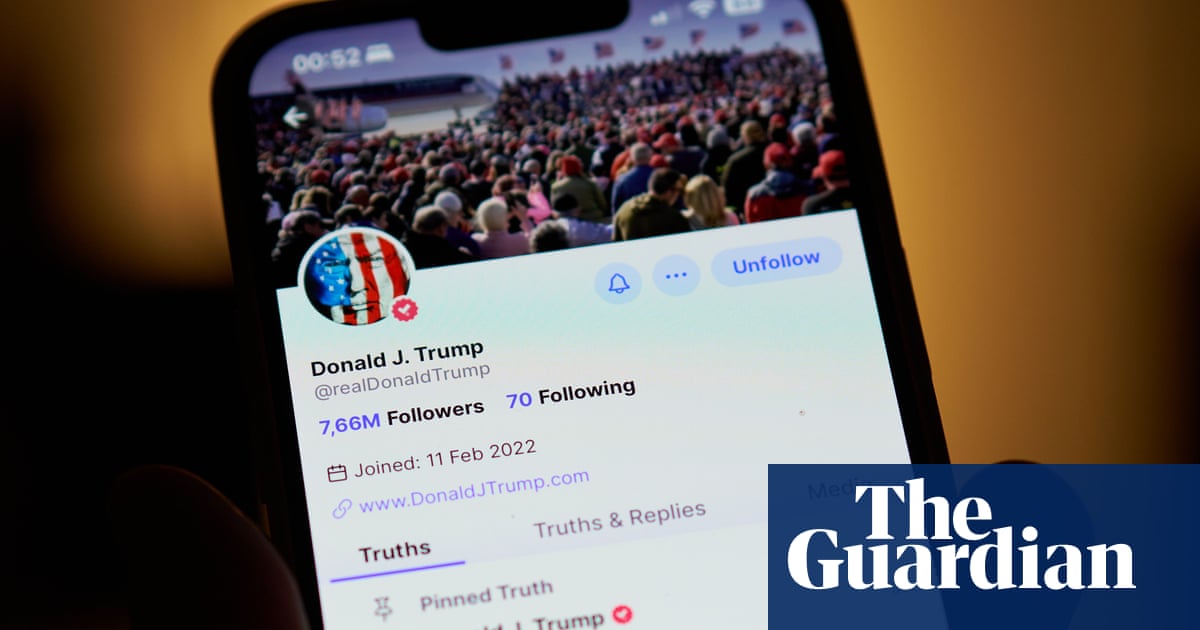Donald Trump’ssocial media posts have emerged as a factor in legal cases brought against hisadministrationby institutions and law firms resisting his attempts to force them to submit to his presidential power.
The president’s vituperative rhetorical assaults on Harvard – whose professors he has denounced as “bird brains” – on his Truth Social platform are being highlighted by the university’s lawyers, who believe they show his attempts to slash its funding and cancel its right to enroll foreign students is fuelled by personal animus.
Trump called Harvard, the world’s richest university, “an antisemitic, far left institution” in a social mediadiatribeafter it sued to block a $2.2bn funding freeze his administration tried to impose.
The same post accused the university of admitting students from “all over the world who want to rip our country apart”, an assertion that has acquired fresh resonance since the attempt to bar it from admitting students from abroad. Around 5,000 foreign students – 27% of the current student body – are currently studying there. He also called some Harvard students “crazed lunatics” who “spew fake anger and hate”.
Last Sunday, after a judge blocked his administration’s attempt to stop Harvard’s right to enroll overseas students, he demanded “names and countries” of every foreign student at the university.
“We want to know who those foreign students are, a reasonable request since we give Harvard BILLIONS OF DOLLARS, but Harvard isn’t exactly forthcoming,” Trumpposted.
Lawyers representing Harvard referenced the posts in their presentation to a court in Boston on Thursday. The judge, Allison Burroughsextendeda temporary restraining order issued last week blocking the ban.
“The Truth Social posts prove a deep hostility to Harvard, and Harvard believes they also suggest that hostility is based on Harvard’s exercise of its first amendment activity,” David Super, a law professor at Georgetown Universitytold the New York Times. “So these quotes help Harvard prove its particular claims.”
In oneespecially vitriolic postlast month, Trump wrote: “Harvard has been hiring almost all woke, Radical Left, idiots and ‘birdbrains’ who are only capable of teaching FAILURE to students and so-called ‘future leaders’.”
Harvard, in common with many other universities, has been accused of failing to combat antisemitism following outbreaks of campus protests over Israel’s war against Hamas in Gaza.
The tug-of-war intensified after its president, Alan Garber, rejected administration demands for reforms that the university bosses say would mean surrendering vital academic freedoms.
Trump has sincethreatenedon Truth Social to strip Harvard of its tax-exempt status, writing: “We are going to be taking away Harvard’s Tax Exempt Status. It’s what they deserve!”
The attempt to block foreign student enrollment – an important source of university revenue – was first announced last Friday by Kristi Noem, the homeland security secretary, whoaccusedHarvard’s leaders of failing to “confront pervasive race discrimination and antisemitic harassment”. She also said the university’s leadership had “engaged in coordinated activity with the [Chinese communist party]”.
Trump’s social media posts have been cited in other recent cases challenging his administration’s actions.
Sign up toThis Week in Trumpland
A deep dive into the policies, controversies and oddities surrounding the Trump administration
after newsletter promotion
In arulingthis month, Judge Beryl Howell cited numerous posts written by Trump about the law firm Perkins Coie in striking down an executive order he issued stripping it of security clearance and the right to access federal buildings.
The executive order was unlike any other issued by previous US presidents, wrote Howell, adding that it “came from a playbook as old as Shakespeare, who penned the phrase: ‘The first thing we do, let’s kill all the lawyers.’”
She added: “Perkins Coie’s representation of President Trump’s political opponent in the 2016 presidential campaign and representation of other clients in connection with election litigation has drawn President Trump’s attention and ire, as reflected in his public statements.”
The vehemence of Trump’s Truth Social musings became an issue in last year’s election campaign. Citizens for Responsibility and Ethics in Washington, a watchdog group,analysed13,000 of his messages and found multiple threats of revenge, retaliation and retribution against his political opponents, including Joe Biden, if he returned to power. One reading ““IF YOU GO AFTER ME, I’M COMING AFTER YOU!” was invoked by prosecutors as evidence in court filings.
Trump, in turn, claimed his posts were being used against him as he fought justice department investigations into his role in the January 6 insurrection and retention of classified documents.
His recent prolific posting also reprises hisactions during a trial last year over a defamation actionbrought by the writer, E Jean Carroll, after she had successfully sued for damages for sexual abuse. At one point, Trump posted more than 35 times – sharing articles from conservative social media about Carroll, who was suing him for defaming her while he was president – over an eight hour period before he was due to testify, while also attacking the trial judge.
Earlier in the proceeedings,he posted more than 40 timesin under an hour, challenging the veracity of her story. Carroll was subsequently awarded $83m in damages.
